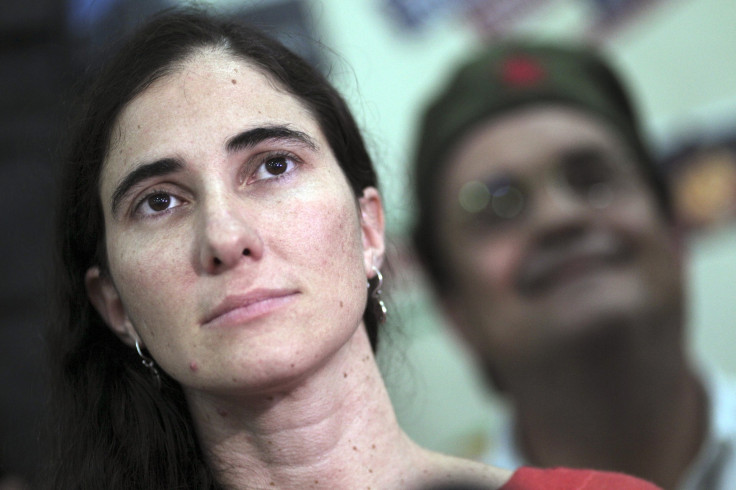Cuban Blogger Yoani Sanchez Talks Press, Internet Freedom In First US Appearance

Cuban dissident blogger Yoani Sanchez made her first public appearance in the U.S. on Thursday in New York, where she discussed her tour around the world, life under Cuba's communist government and her plans for when she returns home.
Sanchez was in New York to give a talk at Columbia University, where she spoke with journalism professor and Cuban expat Mirta Ojito onstage before answering questions from students.
“Yoani Sanchez is a journalist. She’s been accused of all sorts of things in Cuba, but she’s essentially a journalist,” said Joshua Friedman, Director of International Programs at the Columbia Journalism School, who introduced Sanchez. “Yes, she’s a troublemaker, but journalists are supposed to be troublemakers.”
Sanchez gained international recognition for her blog Generation Y, in which she describes daily life in Cuba under the Castro government. The Cuban government labeled her a dissident because of her writings, and so it blocked her blog and Twitter account to censor her.
“It’s a very vivid sense of what’s happening in Cuba, day by day,” Friedman said of Sanchez’s blog. “It seems almost devoid of ideology, and if you‘ve been in Cuba, you can tell it rings true.”
In her first question, Ojito asked Sanchez about her recent visit to a newsroom in Prague.
“I have a very daring -- some might say wild or stupid -- idea of founding an independent press in Cuba,” Sanchez said in her native Spanish through a translator. “We have in Cuba a crime that is called enemy propaganda, and anyone who even thinks about this runs the risk of being accused or convicted of the crime.”
Sanchez remarked that she felt that it was time to move beyond her own personal writing and engage in a “civic exercise” through the establishment of an independent press in Cuba, though she noted that the necessary legal protections that would make such a venture viable were nonexistent presently.
Sanchez said that the majority of Cubans lack Internet access, which results from the government’s fear of losing control over how information is disseminated from within its borders.
“A system that’s based on the lack of information, the control of information and censorship, really can’t remain the same,” Sanchez said. “It will be inalterably changed by the avalanche of information that would result from the opening up of the Internet in Cuba. This is why the government is petrified.”
But even without widely available Internet access, Cubans have found ways to exchange digital information with each other, Sanchez explained, particularly through the use of USB flash drives.
Describing it as an “Internet without Internet,” Sanchez said that one person may get temporary Internet access and download as much data as possible, including everything from news reports to movies, and then share it with several dozen others.
“Someday, when they make a monument to democracy in Cuba, they will build a statue commemorating the flash drive,” Sanchez mused.
Ojito concluded the interview with a question about how the Castro government has responded to bloggers like Sanchez.
“The first strategy was one of trying to ignore us, as if we were not important,” Sanchez said. “That soon passed to … verbally attacking us... to spread lies, to defame our character, never wanting to confront our arguments. Occasionally, that strategy has given way to physical repression and violence.
“The bright side is that this tells us that they’re reading us, they’re responding to us, they can no longer keep ignoring us,” she added. “It shows that we’re having an effect and taking the first steps into the public sphere.”
Watch the full interview and questions from the students in the above video.
© Copyright IBTimes 2024. All rights reserved.





















